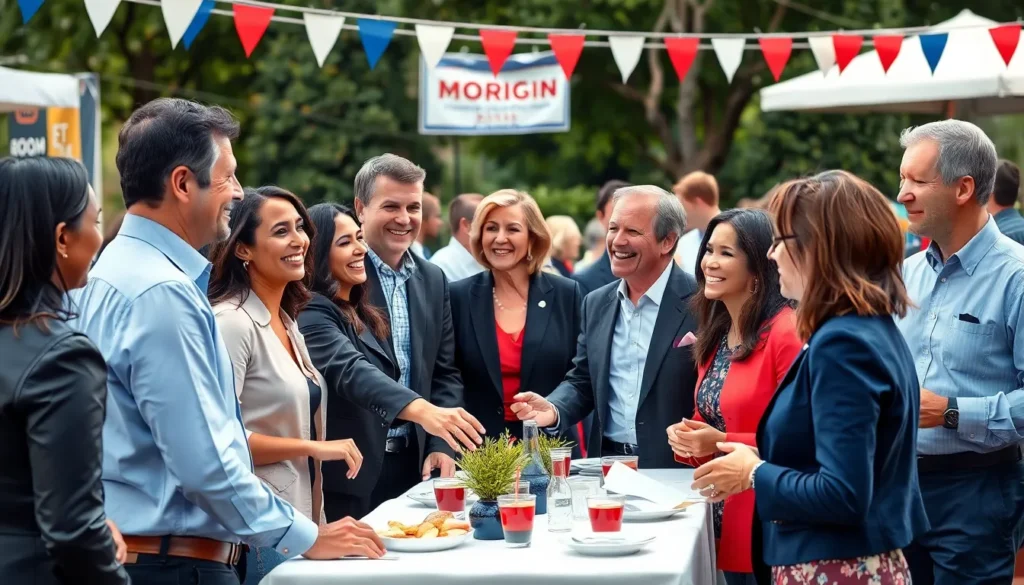In the wild world of politics, fundraising is the lifeblood that keeps campaigns alive and kicking. Imagine trying to win a race without a pair of running shoes—it’s just not gonna happen. From bake sales to high-stakes galas, candidates are on a relentless quest to fill their coffers and secure their shot at glory.
Table of Contents
ToggleUnderstanding Political Campaign Fundraising
Political campaign fundraising serves as the lifeblood for candidates seeking election. Securing adequate funding influences a campaign’s reach and effectiveness.
Historical Context
Fundraising practices have evolved dramatically. In the early 20th century, candidates relied on wealthy donors and local party committees. Major shifts occurred during the 1970s with the introduction of campaign finance laws aimed at regulating contributions. Candidates began using organized events and direct mail solicitations to engage potential donors. The advent of the internet revolutionized fundraising in the 2000s, enabling grassroots movements to flourish. Innovative techniques emerged, allowing candidates to connect with supporters and raise money from diverse sources.
Current Trends
Political fundraising now emphasizes digital strategies. Social media platforms play a crucial role in mobilizing supporters and attracting small donations. Crowdfunding has gained popularity, allowing individuals to contribute with minimal amounts. Additionally, transparency and accountability dominate discussions in campaign finance, reflecting public demand for ethical fundraising practices. The rise of Political Action Committees (PACs) has transformed dynamics, providing candidates access to larger pools of funds. Moreover, micro-targeting through data analytics enhances candidates’ outreach efforts, ensuring fundraising messages reach receptive audiences.
Key Players in Fundraising

Political campaigns involve several key players who contribute significantly to fundraising efforts.
Candidates
Candidates rely on personal networks for initial fundraising. They reach out to friends, family, and supporters to gather donations. Building relationships with constituents enhances their funding potential. Fundraising events organized by candidates attract local supporters, boosting visibility. Engaging storytelling about campaign goals often inspires contributions. Candidates also utilize online platforms to connect with a broader audience. By sharing impactful messages, they convert casual supporters into active donors. Successful fundraising campaigns depend on a candidate’s ability to motivate and engage their base.
Political Action Committees (PACs)
PACs play a vital role in fundraising for political campaigns. They pool contributions from multiple donors to amplify financial support for specific candidates or causes. By targeting strategic issues, PACs attract attention and funding effectively. Large donations from PACs can significantly influence election outcomes. They often promote candidates aligned with their interests, ensuring a strong financial backing. Engaging grassroots strategies allows PACs to mobilize small donors while accessing major funds. Understanding PAC contributions helps candidates strategize fundraising approaches efficiently.
Fundraising Strategies
Fundraising strategies play a pivotal role in a candidate’s success. Candidates utilize various approaches to secure financial support, ensuring their campaigns remain viable.
Grassroots Efforts
Grassroots efforts focus on mobilizing everyday supporters. Engaging local communities through personalized messages fosters a sense of ownership among contributors. Candidates host events such as town halls and meet-and-greets, allowing for direct interaction with potential donors. Digital channels enhance outreach, encouraging small donations from a broad audience. Social media serves as a powerful tool for amplifying these efforts, creating viral campaigns that rally supporters. Donors appreciate transparency in how funds are used, with candidates showcasing their alignment with community needs. Initiatives like peer-to-peer fundraising can also tap into personal networks, broadening the donor base.
Major Donor Cultivation
Major donor cultivation emphasizes the importance of building relationships with high-net-worth individuals. Tailored engagement strategies enable candidates to connect on shared values and priorities. Personal meetings and private events allow candidates to express their vision while soliciting support. Researching potential major donors ensures that candidates approach individuals aligned with their campaign goals. Furthermore, exclusive experiences or VIP events can enhance donor loyalty and lead to increased contributions. Follow-ups after interactions reinforce candidates’ commitment and gratitude. Maintaining communication with major donors helps in cultivating long-term relationships that can drive substantial financial backing throughout the campaign.
Legal Regulations
Political campaign fundraising operates within a framework of legal regulations that govern contributions and spending. These laws aim to promote transparency and fairness in the election process.
Contribution Limits
Federal law sets specific contribution limits for individual donors, currently capping donations at $2,900 per election cycle for federal candidates. State laws may vary, often imposing lower limits on contributions. Political Action Committees (PACs) face their own restrictions, allowing contributions up to $5,000 per candidate per election. Candidates can also receive unlimited support from their personal funds, affecting overall campaign financing dynamics. These limits ensure that no single donor’s influence overwhelms the electoral process.
Reporting Requirements
Compliance with reporting requirements is essential for candidates and committees. They must regularly disclose sources of contributions and expenditures, typically through periodic reports filed with the Federal Election Commission (FEC). Deadlines for these filings occur frequently, requiring meticulous record-keeping and transparency. Additionally, certain states impose their own reporting requisites, necessitating awareness of local laws. Accurate reporting fosters accountability, enabling voters to understand where campaign funding originates and how it is allocated.
Political campaign fundraising is an intricate dance of strategy and engagement. Candidates must adapt to evolving methods and regulations to effectively connect with supporters and secure necessary funding. The shift towards digital platforms has opened new avenues for grassroots movements while emphasizing transparency and ethical practices.
As fundraising continues to shape the political landscape, candidates who master these dynamics stand a better chance of mobilizing their base and achieving election success. Understanding the nuances of fundraising is key for anyone looking to navigate the complexities of political campaigns in today’s fast-paced environment.





